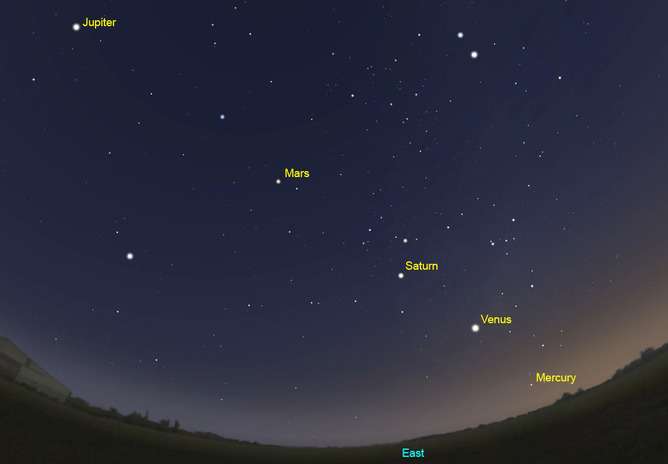Today's celestial events
[ A blog on the universe and the cosmos above and the nature of it determined by great scientists. ]
- Today's celestial event
- Why is so unique
- Which celestial events should you look forward too.
What makes today's celestial event so special is the unique lining of Saturn, Jupiter and Mars across the night sky. It is a very unique pattern which these planets form across the night sky making it really majestic to watch.
Saturn is the second largest planet in our solar system and the only planet whose rings can be observed through. The second planet after the kuiper belt and one visible through our naked eye is also easily visible in the night sky.
Jupiter being the largest planet in our solar system and also being one of the 5 brightest stars in night sky. It is easily visible and observable from the earth's surface.
Mars is easily visible in a clear night sky. It can be spot as a bright red spot in the. Mars is actually the brightest planet visible in April's night sky and also among the few brightest planets visible in night sky which can also be observed without using a telescope.
five brightest stars in the night sky
Now heading towards the timings and the zones in which this trinomial series of stars will be witnessed :-
Planet rising time setting time Places visible in
Mars 02 : 22 am 13 : 33 pm across world
Jupiter 01 : 24 am 12 : 27 pm " ----------"
Saturn 01 : 45 am 12 : 51 pm "----------"
Mercury 05 : 28 am 17 : 35 pm "----------"
Venus --- --- ---
Uranus 07 : 02 am 19 : 41 pm "----------"
Neptune 04 : 32 am 16 : 21 pm "----------"
[ disclaimer - These timings mentioned above are in relevance with the Indian Standard Time zone (IST - Kolkata ) ]
These planets while aligning themselves will also uniquely align the moon showing up some brilliant patterns in the night sky . this natural night show of these celestial bodies will be visible between April 4th and April 6th
Why is it so unique :
The reason why this celestial event is very unique is that the 3 planets ; namely Mars, Jupiter and Saturn are quite away from each other and hence also orbit sun in varying orbits. The orbit of Mars is around 1.5 times greater than that of earth while the orbits of Jupiter an Saturn are even bigger as they lie further away from Mars.
Another important thing is that all of these planets have different velocities at which they revolve around the sun. This becomes even more rare occurrence of these planets coming in a specific pattern within themselves as well as with the moon. This rare occurrence makes this celestial event quite noticeably in the night sky.
Other celestial event to look forward to :
Well this trinomial series is really worth a watch, but there are many more celestial events that are going to be occurring this year. The list includes eclipses, meteor showers, transits and much more. So the below table will guide you through some of the most jaw dropping events of the year ( which I handpicked for you ) which you certainly can't afford to miss.
|
S.R
|
Date
|
Name of the event
|
Some inormation
|
Status
|
|
|
12/8/2020 -
13/8/2020
|
Perseids Meteor Shower
|
The meteor shower that originates from the perised constellation
|
Just over, better luck next time !
|
|
2.
|
01/10/2020
|
Mico Full Moon
|
Full moon when the moon is farthest from earth
|
Coming up
|
|
|
08/10/2020 -
09/10/2020
|
Dracnoid Meteor Shower
|
One of the annual meteor shower we experience
|
Coming up
|
|
3.
|
21/10/2020 -
22/10/2020
|
Orinoid Meteor Shower
|
One of the annual meteor shower we experience
|
Coming up
|
|
4.
|
31/10/2020
|
Blue moon
|
A very rare phenomena where a month has 2 full moons
|
Coming up
|
|
5.
|
15/11/2020
|
Super New Moon
|
The New Moon when the moon is closest to earth
|
Coming up
|
|
6.
|
17/11/2020 -
18/11/2020
|
Leonid Meteor Showers
|
Named Lenoid because of its point of origin in sky is from the
constellation Leo
|
Coming up
|
|
7.
|
04/12/2020 -
17/12/2020
|
Geminid meteor Showers
|
One of the only meteor shower that occurs by the debris of a comet
|
Coming up
|
|
8.
|
14/12/2020
|
Total Solar eclipse
|
When moon completely covers the sun disc
|
Coming up
|
|
9.
|
21/12/2020 -
22/12/2020
|
Ursid Meteor Showers
|
Is named after a constellation -ursa minor.
This is also the last meteor shower of the year
|
Coming up
|
Also you can subscribe to our blogs by you email id, or by just simply clicking the orange button on the right side of the page. If you do so then we will be able to send out our articles straight to you or send you a notification about the upcoming celestial events. This way you will be able to spot the events pretty easily without a need to memorize the dates.
So friends , hoping that from the information shared above you'll would be able to witness the rare phenomenons.
For the next topic of our blogs I have a question for you'll :- Which is the only celestial object in our solar system excluding earth which has a dense atmosphere ? Think and answer in the comment section below

Comments